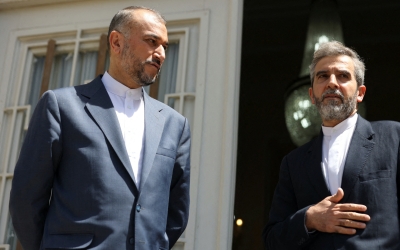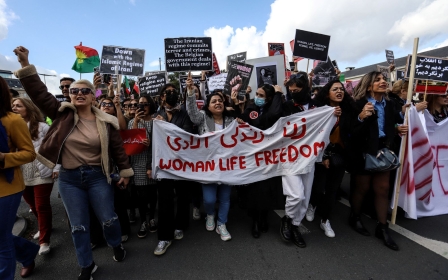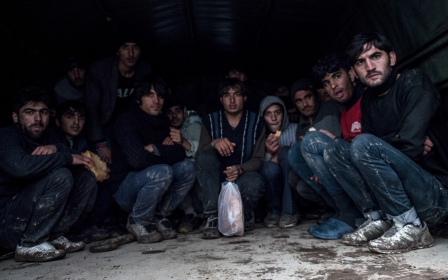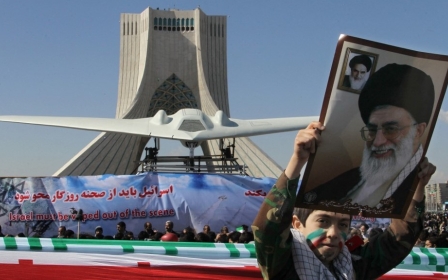What is preventing the revival of the Iran nuclear deal?
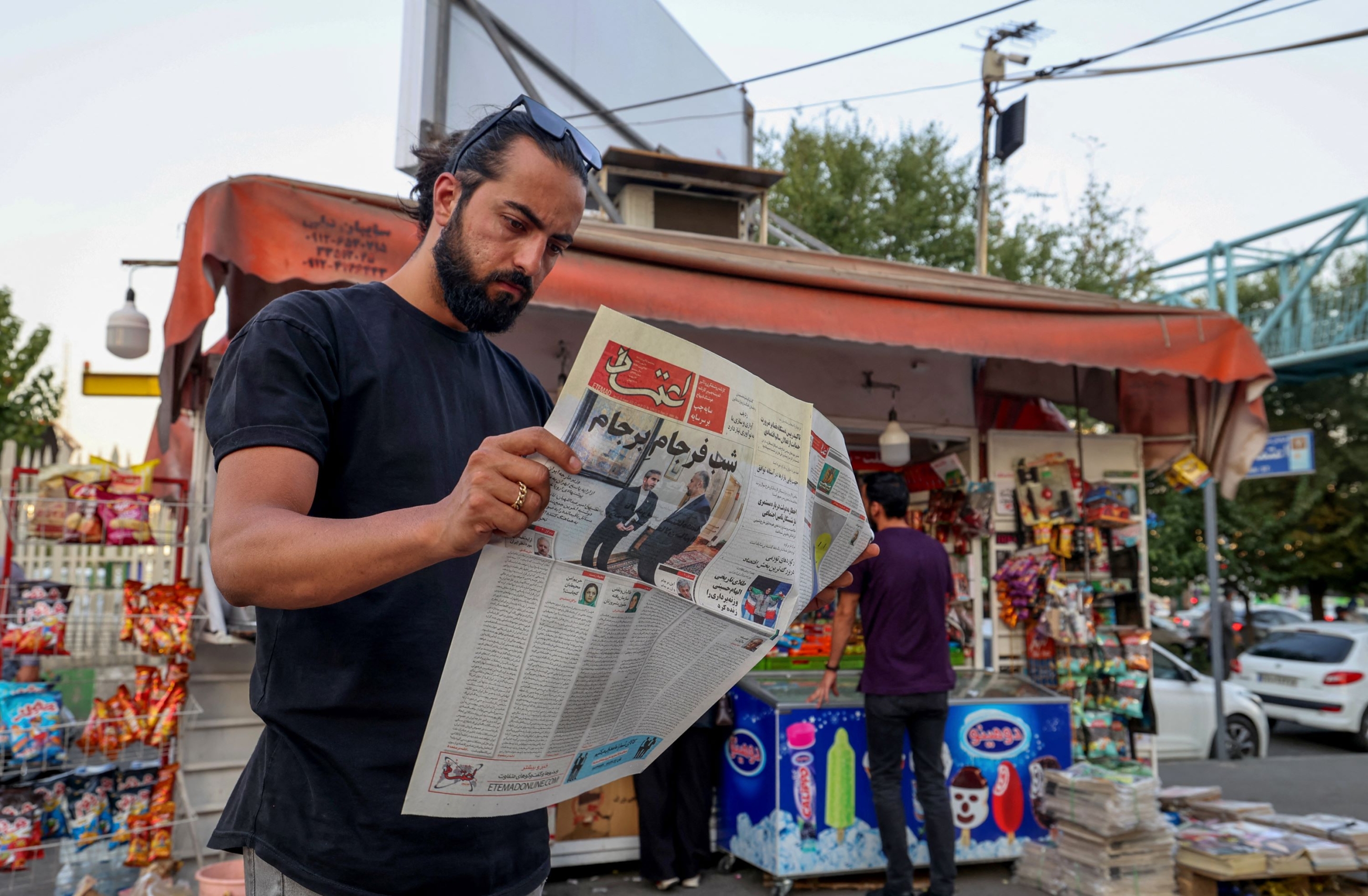
A lack of consensus or a figure "courageous" enough to overcome internal opposition are the main reasons impeding efforts by Tehran to revive the 2015 nuclear agreement, sources in Iran have told Middle East Eye.
Iran and the P5+1 group of the countries - US, UK, France, Russia, China, and Germany - reached a deal in 2015 to put limitations on Tehran’s nuclear program in return for a lifting of sanctions. In 2018, despite Tehran's compliance with the deal, former US President Donald Trump exited the agreement, reapplying heavy sanctions against Iran.
Since taking office, President Joe Biden has sought to return the US to the agreement - officially called the Joint Comprehensive Plan of Action (JCPOA) - but the two sides have so far failed to revive the deal despite months of talks in Vienna.
One former Iranian diplomat told MEE that domestic and global events, not least Iran's close ally Russia invading Ukraine, also appear to have conspired to undermine the chances of a return to the deal.
“Currently, the US is still willing to sign the deal, but we don’t have too much time," he explained.
"Personally I don’t have any hope as an angry Europe and the US are seemingly waiting for a turning point in the Ukraine war to raise the pressure and...bring back all the dangerous UN security council resolutions against Iran. “
JCPOA resurrection?
The election of Ebrahim Raisi, a conservative former opponent of the deal, as president of Iran in 2021, initially seemed to dash hopes that - with Trump out of office - the JCPOA could be resurrected.
However, upon taking office, Raisi appeared to indicate a willingness to return to the agreement and talks were initiated. But so far there has been no success.
'Raisi has no courage to stand and defy all the opponents, and tell Bagheri to close the deal'
- Source close to conservatives
A reliable source, who used to be involved in the talks, told MEE that on the Iranian side, the JCPOA had become a victim of opposition, lack of consensus, political infighting, and a failure of courage.
“Inside the Supreme National Security Council, there is no agreement on the current draft of the deal," the source said on condition of anonymity for security reasons.
"For instance, Saeed Jalili, a former nuclear negotiator and the current representative of the Supreme Leader Ayatollah Ali Khamenei to the council, and Mohammad Bagheri, the chairman of Iran’s Armed Forces, are among the opponents of the current draft of the agreement."
He added that Ali Shamkhani, the Secretary of the National Security Council, had adopted a "strict position, and doesn’t want to be labelled as either an opponent or advocate of the deal, and has no will to pay any price to stand behind the agreement.”
Meanwhile, according to the same source, Ali Bagheri, the lead negotiator - who used to be a staunch enemy of the JCPOA up until two years ago - had now turned into a full supporter of JCPOA and an agreement to revive it.
However, he said, “while [Ali] Bagheri would like and has the will to seal the deal more than anyone in the country, he doesn’t have the courage to go forward, sacrifice himself and take the responsibility of signing an agreement that has many opponents, including Parliament Speaker Mohammad Bagher Ghalibaf, who believes the deal has no economic benefits.”
Costly transformation
Bagheri’s transformation has been costly for him as the disagreements and hostility of his former boss and friend Jalili have heightened, resulting in, firstly, Bagheri removing a Jalili man from the negotiation team and, secondly, Jalili’s team leaking a draft of the deal in February 2022.
Speaking to MEE on condition of anonymity, a source close to the conservatives also spoke of Bagheri’s transformation from anti-deal to a supporter of the JCPOA.
“Even the [supreme] leader has seemingly no intention to be known as responsible for the deal as he has given President Ebrahim Raisi full authority on the nuclear talks, but Raisi has no courage to stand and defy all the opponents, and tell Bagheri to close the deal," he said.
The source added that in September when a final draft was on the table, Bagheri was ready to take Foreign Minister Amir Abdollahian to Vienna and declare the revival of the JCPOA, but former negotiator Jalili put on new conditions and persuaded the key decision-makers to add these conditions to the draft, which later was met with the full rejection of the US government.
Between 2013 and 2015, when former moderate president Hassan Rouhani and foreign minister Mohammad Javad Zarif were in charge of negotiations with the US, they were constantly under pressure from the opponents of the deal and powerful principlist figures.
Even Shamkhani, who had been appointed by Rouhani, wasn’t willing to support them, said a former official of Rouhani's administration.
"Yet, Rouhani and Zarif finally went ahead and signed the deal while they knew they would come under fire as key influential hardline figures were against the agreement," said the official.
"That’s why some figures at the time were saying Rouhani-Zarif sacrificed themselves for the country as they decided to act like a shield in order to make the deal possible.
“What enabled Rouhani and Zarif was the full support of the people and the great social capital they enjoyed, but today the hardliners, who were all against the deal in 2015, are negotiating the revival of the deal, that’s why they don’t dare to sign the agreement as they are afraid of their supporters too.”
This article is available in French on Middle East Eye French edition.
Middle East Eye propose une couverture et une analyse indépendantes et incomparables du Moyen-Orient, de l’Afrique du Nord et d’autres régions du monde. Pour en savoir plus sur la reprise de ce contenu et les frais qui s’appliquent, veuillez remplir ce formulaire [en anglais]. Pour en savoir plus sur MEE, cliquez ici [en anglais].


